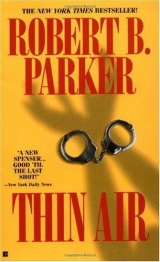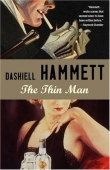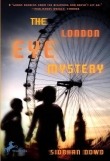
Текст книги "Thin Air"
Автор книги: Robert B. Parker
Жанр:
Крутой детектив
сообщить о нарушении
Текущая страница: 6 (всего у книги 14 страниц)
Chapter 13
Quirk came into my office like he always does, like it was his, and don't argue about it. He was wearing a tan suit and a blue-striped shirt with a button-down collar and a khaki-colored knit tie. It was as springlike as the weather, which was soft and flowery with a slight breeze drifting in through the open window. He pulled one of my client chairs around and sat down and put one foot on my desk.
"What have you got?" Quirk said.
"There's a guy named Luis Deleon," I said.
"Yeah."
"He's an Hispanic guy from Proctor who Lisa met in a class at Merrimack State."
"Un huh."
"Apparently Lisa had a relationship with him, before she met Belson."
"Un huh."
"You been listening to her answering machine tapes?" I said.
"Yeah. Guy has maybe a little Spanish accent, on the tape. Says he's going to stop by."
"Could be Deleon," I said.
"And?"
"He lives in a section of Proctor called San Juan Hill," I said. "I've talked to some people. He's sort of a figure there. Wrong side of the law, I think. The way I hear it, Deleon may also be on the wrong side of the local Godfather, Freddie Santiago."
"Santiago's got a lot of juice in Proctor," Quirk said. "You speak any Spanish?"
"No," I said.
"You know where this guy Deleon is?"
"No. San Juan Hill someplace, but we don't have an address yet."
"We probably ought to get one," Quirk said.
"She may not be with him."
"Sure," Quirk said. "But it's the best lead you got. What are you waiting for?"
"If Lisa's with Deleon, voluntarily or involuntarily, we need to go a little careful."
"Yeah."
We were quiet. The spring air drifted in through the window and ruffled the newspaper on my desk.
"I'll see what we got on Deleon," Quirk said, "if anything."
"Maybe you should check out Lisa's background, a little."
"We have, a little," Quirk said.
"And?"
"Goes back a couple years," Quirk said, "without anything unusual-and then nothing. It's like she didn't exist prior to 1990."
"How hard did you look?"
"Hard enough. We lifted some prints from the house that are probably hers. We're waiting to hear."
"What about her references and stuff at the radio station?"
"Checked them," Quirk said. "They never heard of her."
"Previous employment, all that?"
"Fake."
"Academic credits when she entered Merrimack State?"
"None required. It's open enrollment, continuing education."
"Might explain the everything-started-the-night-we-met deal she had with Belson," I said.
"Might," Quirk said.
"Anybody named Vaughn crop up while you were looking?"
"Yeah, I saw that on the calendar pad," Quirk said. "Whoever he is, I haven't found him."
"You got anything on the shooting?"
"One of the neighbors is a nurse. Husband's a gastroenterologist at Brigham. She was coming home from Faulkner Hospital after work, says she saw a yellow van parked by the pond a little before the shooting. Said she noticed it because of how it was kind of ugly for the neighborhood."
"She didn't get a plate number."
"'Course not. Doesn't know what kind of van or what year. Just an ugly yellow van."
"Anything on the bullets?"
"They were nine millimeter Remingtons, we found the brass."
"That narrows it down," I said.
"Yeah," Quirk said. "In Proctor they sell them in vending machines."
"You think it's connected to Lisa?"
"Yeah."
"Doesn't have to be," I said.
"That's right, what do you think it's connected to?"
"Lisa," I said. "Let me know when you get something on the prints."
"Sure," Quirk said.
The slim gray-haired woman with the young face came into the room and took away the dishes. There was a single silver streak in her hair. She was dressed in jeans and a pink sweatshirt. She neither looked at Lisa nor spoke. She was careful not to look at the glowing video monitors where the tapes ran their endless loops. As the woman left, Lisa could see past her into the hallway outside the door, where a man in a flowered shirt open over his undershirt leaned on the wall. She could see the butt of a handgun stuck into his belt, to the right of the buckle. The door closed. She heard the key turn. Then silence, except for the soft electronic hum of the monitors. She walked about the room. She went into the bathroom and looked at herself in the mirror. She was wearing a safari outfit today, like Deborah Kerr in King Solomon's Mines. He had chosen it, and she didn't argue. She had decided soon after she was captured that she wouldn't fight the small battles. He wanted her to dress up like the movies, it would do her no harm. She was waiting for the big battle. She would have only one chance and she didn't want to squander it. She couldn't do it yet because it would do her no good to hit him and flee when an armed guard stood outside the door. The less trouble she gave him, the more he might be careless. And maybe once the door would be unlocked. Maybe once there would be no armed guard. And if the door were always locked and the guard always there and the chance never materialized?… Frank would come, sooner or later, he'd show up. She knew that. And knowing something certain was a handhold on sanity. She smoothed her hair back from her forehead and looked at herself in the mirror. She looked like she always looked. It was probably a truth about tragedy, she thought, while the tragedy is going on people look pretty much the way they looked when it wasn't. She turned and walked back into the bedroom. The monitors were looping the tape of her kidnapping, herself lying bound on the floor in the back of his van. She paid them no attention. She was hardly aware of the monitors at all. They had become so much a part of her limited landscape that they were barely tangible.
Behind her she heard the key in the door lock, and then he came into the room.
"Chiquita, " he said. "You look just as I'd hoped. Turn around, please. All the way around. Now walk toward me. Yes. It is just as I'd hoped."
He was wearing a loose-fitting white shirt, with big sleeves. The shirt was open at the neck and unbuttoned halfway to his waist. He wore tan riding breeches and high cordovan-colored riding boots. She tried to remember the movie poster he was modeling. Lives of a Bengal Lancer? Elephant Walk? She couldn't remember. But she knew that he coordinated what he would wear with the way he dressed her. He would lay out her clothes before he left her the night before, if it was night. She never knew. When he came in the next day, if it was the next day, he would be costumed to match. His very own, anatomically correct mannequin, she thought as she modeled her outfit. He smiled at her and put out his arm, crooked, as if for a promenade. "Come, querida, I have a treat for you."
She remained unmoving, not sure what he wanted.
"Come, come," he said. "We will take a little walk. It is time the queen toured her realm."
She walked slowly to him, and put her hand on his arm lightly. And they turned and walked out the door.
Chapter 14
I took off my tool belt and hung it on a nail on one of the bare studs in the torn-out living room of the old farm house we were rehabbing in Concord, Mass., about three miles from the rude bridge that arched the flood. It was lunchtime. Susan had gone out and bought us some smoked turkey sandwiches on homemade oatmeal bread at Sally Ann's Food Shop. Now she was back and we sat out at our picnic table on the snow-melt marshy grass in the yard and ate them, and drank Sally Ann's special decaf blend from large paper cups.
"I don't know why you kvetch so about decaffeinated coffee," Susan said. "I think it tastes perfectly fine."
Pearl the Wonder Dog hopped up onto the picnic table and stared at my sandwich from very close range.
I broke off a piece and gave it to her. It disappeared at once and she resumed the stare.
"You lack credibility, Suze," I said. "You could live on air and kisses sweeter than wine."
Susan gave half her sandwich to Pearl.
"This is true," Susan said. "But I still can't tell the difference."
Pearl stared at my sandwich some more, her eyes shifting as I took a bite.
"You know, when I was a kid," I said, "neither my father nor my uncles would let the dog up on the dining room table. Not even Christmas."
"How old fashioned," Susan said.
It was one of the first warm days of the year, and the sun was very satisfying as it seeped through my tee shirt. I took one final bite of the sandwich and gave the rest to Pearl. It was big enough to be taken someplace, so Pearl jumped off the table and went into the house with it. Susan looked at me with something which, in a lesser woman, would have been a smirk.
"It's the gimlet eye," I said. "I get worn down."
"Anyone would," she said. "How is Frank?"
"I guess he's going to make it, but he's still in intensive, still full of hop and drifting in and out. And they still don't know when he'll walk."
"Are you making any progress finding Lisa St. Claire?"
"I've found an old boyfriend," I said.
"Cherchez l'homme," Susan said.
"Maybe. He's an Hispanic guy from Proctor named Luis Deleon. He might be the one on her answering machine that might have had an accent and said he'd stop by later. I played the tape for Lisa's friend Typhanie-with a y and a ph-and she couldn't say for sure, but it might be him. He's apparently the guy Lisa was with before Belson."
"And you think she might be with him?"
"I don't know. Awful lot of might-be's. But I don't have anyplace else to look, so I'll look there."
"I hope she's not with someone," Susan said.
"Yeah. But, in a sense, if she is, Belson will know she's not dead, and he'll know what he has to fight."
"The voice of experience."
"Disappearance is terrifying," I said. "Whether me or him is painful, but it's clear."
"And you've not spoken with Frank about this?"
"Mostly he doesn't know what day it is," I said. "But even if he did, what's to talk about?"
"One would assume if you were looking for a man's wife, you would want to talk with him about it if possible. If only to offer him emotional support."
"He won't want to talk about it," I said. "Except as a case."
"Maybe you should help him, when he's able."
"Some people," I said, and stopped and took a significant bite of the second sandwich, "even some very intelligent people, even now and then some very intelligent shrinks, sometimes think that not talking about things is a handicap. For the people who aren't talking about things, however, it is a way to control feelings so you won't be tripping over them while you're trying to do something useful. Containment is not limitation. It is an alternative to being controlled by your feelings."
Susan smiled.
"How artful," she said. "You're talking about men and women, but you don't specify."
"I don't think it's necessarily gender differentiated," I said. "Lot of women are critical of a lot of men on the issue, and a lot of men feel that women don't get it. But I hate to generalize. You, for instance, are very contained."
"And there are moments when you are not."
Pearl came loping back from the house toward my second sandwich. There was an accusatory look to her as she came, unless that was just projection on my part. I got another large bite in before she reached me.
"Like when?" I said around the bite.
"You know," Susan said. "I don't wish to speak of it in front of the baby."
"She has to know sometime," I said.
Pearl rested her chin on my knee and rolled her eyes up to look at me. I gave her the remainder of my sandwich.
"I think she knows everything she needs to know, now," Susan said.
Pearl bolted down the remainder of my lunch and wagged her tail.
"You won't tell the guys, will you?" I said. "That the dog bullies me?"
"No," Susan said. "Or that you let me see your emotions from time to time."
"Whew!"
"Have you located this man Deleon?"
"No. I've talked to the cops and a priest. He's somewhere in Proctor. Monday, I'm going to talk to a guy named Freddie Santiago, who's sort of the mayor of Hispanic Proctor."
"Isn't that most of Proctor?"
"Yeah, nearly all."
"But he isn't the real mayor."
"He may be the real mayor. But the official mayor is a guy named Harrington."
"Is Hawk helping on this?"
"Hawk's in Burma," I said. "Right now, I need someone who speaks Spanish."
"Burma? What can Hawk be doing in Burma?"
"Better not to know," I said. "Gives us deniability."
Chapter 15
When he came into the coffee shop at the Park Plaza, Quirk looked like he always did, thick bodied, neat, clean shaven, fresh haircut, hands like a mason. Today he wore a blue suit and a blue-and-white striped shirt. He slid into a seat across from me and ordered some coffee.
"Deleon is dirty," he said.
"Not a surprise," I said. "How bad is it?"
"Pretty bad," Quirk said. "He's been arrested twice on assault, once on possession with intent… once for rape. He walked on both assault charges when the witnesses failed to appear. He walked on the rape charge when the victim recanted. He got a suspended sentence and three for the possession with intent."
"The wheels of justice grind exceeding slow," I said.
"Don't they?" Quirk said. "He is suspected of, but never charged with, several murders associated with the drug trade, and probably some homicides related to some kind of sporadic turf war going on up there between him and Freddie Santiago. Freddie's got them outnumbered, I'm told, and owns most of the city. But Deleon and his outfit are so mean and violent and plain fucking crazy that Freddie has never had the nads to go into San Juan Hill and dig them out."
I nodded. A waitress came over and poured coffee into Quirk's cup.
"Would you like a menu?" she said.
Quirk said, "No, you got a couple plain donuts?"
The waitress said that she had and went to get them.
"You got any history on him?" I said.
"More than you want to read," Quirk said. "Department of Ed's got core evaluations. DYS got counseling reports. There's a file in the Department of Employment and Training, the Probation Commission, Department of Social Services, Public Welfare, probably the Mass. Historical Commission. If there was a state service this kid used it."
"How old is he?"
"Twenty-six. Born in Puerto Rico, came here as a baby. His mother was a hooker, father unknown. Mother was a crack head, committed suicide ten years ago. No record of him finishing school. He was in an outreach program at Merrimack State for a while. Which is probably where he met Lisa. Started in 1990. Lisa was there then."
The waitress returned with the donuts. She refilled Quirk with real coffee and freshened up my decaf.
"Got a picture?" I said.
Quirk nodded and handed me a mug shot, full face and profile. The first thing I noticed was that women would think he was handsome and most men wouldn't. He had a thin face with big dark eyes, and a strong nose. His hair looked longish and he was probably twenty-one or -two in the mug shot. I read his stats on the back: 6'5", 200 pounds. We were in the same weight class, but he'd have reach on me.
"DYS counseling report says he shows signs of incipient paranoid schizophrenia and is deemed capable of sudden violent rages."
"Sounds like you," I said.
"Yeah, I'd probably have incipient paranoid schizophrenia, if I knew what it meant. You interested in the prints we lifted on Lisa?"
"Isn't that cute," I said. "Yes, Lieutenant, I am agog with interest."
"Nice of you to notice that I'm cute," Quirk said. "Prints belong to somebody named Angela Richard." He gave it the French pronunciation. "She was busted in LA in 1982 and again in '85 for soliciting."
"No mistakes?" I said.
"No, they sent us her pictures. It's Lisa."
"Jesus Christ," I said. "Belson know?"
"Not yet."
"You going to tell him?"
"No, you?"
"Not yet," I said.
Quirk picked up his second donut, leaned back in his chair and looked past me out the big plate glass window at Park Square, where the yellow cabs were queuing up near the hotel entrance. The doormen were opening their doors with a flourish and pocketing the tips deftly.
Quirk said to me, "You got some connections in LA, don't you?"
"Cop named Samuelson," I said. "LAPD."
Quirk nodded.
"You decide you want to bust that tenement up in Proctor, gimme a shout."
"Sure," I said.
Quirk finished his donut and left. I watched him as he walked past the picture window, a big, solid, tough guy, whose word you could trust. He swaggered a little, the way cops do, as he walked toward St. James Avenue.
Chapter 16
Susan and I were aboard American flight number 11 when it took off without incident at nine a.m. We ate breakfast on the plane and speculated between ourselves as to what it was. Then Susan put on her earphones to watch the movie. And I settled in to read the rest of my current book, Streets of Laredo, and worry about crashing. I worried less while we were flying along. They didn't usually fall suddenly from the sky.
"It's just a control issue," Susan said. "The drive to the airport is probably more dangerous."
"You think it's too early to start drinking?" I said.
"Well." Susan looked at her watch. "It's about seven a.m. in Los Angeles."
"Right," I said. "The movie any good?"
"Oh God, no," Susan said. "It's hideous."
"So how come you're watching it?"
"So I won't think about how high we are," she said.
"You're scared too."
"Of course I am," Susan said and smiled at me. "But I'm a girl."
Over Flagstaff, Susan took her earphones off and said, "Why was it, exactly, that we are going to Los Angeles?"
"To check into the Westwood Marquis and have sex," I said.
Susan nodded. "Check in, unpack, and have sex," she said.
"Of course."
"Didn't you say there was something to do with Frank's wife?"
"Quirk ran down her fingerprints," I said. "LAPD arrested her for prostitution. Twice, 1982 and 1983. At that time her name was Angela Richard."
"My God, does Frank know this?"
"If he does, he's kept quiet about it," I said. "We haven't told him."
We were just above the San Gabriel Mountains now, so close that it seemed you could step out onto one of the peaks.
"And you want to see if you can get some information out here that will help you find her?"
"Yeah."
"How's that going to work?" Susan said.
"I don't know. Maybe it won't. I got no master plan, I feel my way along."
"Why should you be different?" Susan said.
We slid past the San Gabriels, drifted down over the San Fernando Valley, landed without crashing, got our rental car, and drove in from the airport on 405.
"Do we know how old Lisa is?" Susan said.
"Gave her age as nineteen in 1982," I said. "If she was telling the truth, makes her thirty-one."
"I could have done the math," Susan said, "in time."
"Yeah, but we're only here a few days," I said.
The Westwood Marquis is located just out of West wood Village, across from UCLA Medical Center. It has two pools, a health club, and a spectacular brunch, and a lot of gardens. Our room was painted blue. It had a small sitting room, a bath, and a bedroom with a big bed and a bank of mirrored closet doors. Susan looked at them and looked at the bed.
"Are you going to peek?" she said.
"You bet your boots," I said.
"Pornographer," Susan said and began to unpack.
To watch Susan unpack was to witness a process as elaborate and careful as a spider weaving a web. While she carefully unfolded and shook out and hung each item behind the mirrored doors, I took a shower and put on one of the terrycloth robes the hotel provided. It fit me like a hot dog casing on a knockwurst. Susan finished her unpacking, ran a bath, and went into the bathroom "to fluff up." I closed all the mirrored doors she had left open, and checked the angle of reflection. After a while Susan emerged with a white terrycloth robe clutched voluminously around her.
"First we'll have to agree that there'll be no peeking in the mirror," she said.
"Of course not," I said.
My voice was rich with sincerity.
"Can you get your arms out of those bathrobe sleeves?" she said to me.
"Probably," I said.
"Well, why don't you?"
Later in the afternoon we lay quietly in the bed together, with Susan's head on my shoulder.
"What's the plan?" she said.
"I know a cop out here named Samuelson," I said. "Met him when I was out here with Candy Sloan a long time ago."
"I remember."
"I called him a couple of days ago. He said he'd dig up Angela Richard's file and I promised him lunch at Lucy's."
"And then?"
"And then we'll see," I said.
We were quiet for a time, listening to the faint hum of the air conditioner, watching the sunlight on the blue walls. Susan turned her head on my shoulder and looked straight at me from maybe six inches away. Amusement moved in her big eyes, and something else, a hint of depravity, or joy, or excitement, or all three, that I'd never quite been able to figure out.
"Did you peek?" Susan said.
"Absolutely not," I said.
"Are you lying?" she said.
"Absolutely am," I said.
They walked out into the corridor. The guard was there. Not the same one she'd seen earlier; they probably changed shifts frequently. The floor of the hallway was linoleum which had been painted with maroon deck paint so that it had once had a shiny gloss. But the linoleum had buckled and there were cracks spidering across the enameled surface, and the sheen was nearly gone. She felt almost dizzy at coming out of the room into the daylight. It was like the way she felt coming out of an early afternoon movie. She had not seen daylight since he'd brought her here. Before them a small-boned, black-haired young man with two long braids and a blue bandanna tied into a headband like Willie Nelson was backing down the corridor ahead of them, the video camera leveled, the tape whirring faintly. The corridor walls were half paneled with narrow grooved red oak boards that had been varnished once, and were now almost black with age and dirt. The walls above were white-painted plaster grown gray by the same process that had aged the oak wainscotting. "Downstairs, Lisa mia, your people are waiting to greet you."
My people, I don't have any goddamned people. Frank is my people. She kept her face composed. At least she didn't look as ridiculous in her safari outfit as she might have had he chosen to parade her about in her Moll Flanders outfit. They went down narrow stairs covered with frayed rubber mats on each step so you shouldn't slip. At the bottom was the kitchen, with a huge old yellow Glenwood gas range that stood on bowed black legs. The sink was soapstone, and two shabby-looking refrigerators stood side by side against the left-hand wall. One of them had the condenser equipment on top of it. A big table occupied the middle of the room. It was the kind that hotels use to set up banquet rooms. It had a splintery plywood top, and folding metal legs. There were some flowers in a coffee can in the middle of the table, and five or six assorted straight chairs set around the table. Five small children, three girls and two boys, were playing in diapers and little else, on the floor under the table. The slim woman in the pink sweatshirt who had brought Lisa's food was there, and a fat woman in a tight lavender sweatsuit. They were sitting at the table, minding the children, eating occasionally from a large open bag of Vincent potato chips that lay on its side on the table.
Luis said something to them in Spanish. They stared at her and nodded.
"Lisa," Luis said, "this is my cousin Evangelista, and my friend Chita."
"Do you know that he has kidnapped me?" Lisa said.
The two women looked at her without expression. "That is a bad word to use here, Lisa," Luis said. "I have simply reclaimed what is mine. And, of course, they do not speak English."
Beyond the women at the table a door led into the backyard. Through it she could see small children, somewhat older than the babies in the kitchen, playing in the courtyard formed by the enclosing tenements. He walked with her to the door. She went volitionlessly, and stood silently beside him on the back step. There was a bent and rusty metal swing set on one side o f the yard, and a pile of sand on the other. The grass had been worn away and the earth was bare and muddy from the rain. Each of the tenements had a back porch
on each floor and en masse they rose like balconies in a decrepit theater. On the first-floor back porch directly opposite her, seated among the pieces of wash hanging damp on the sagging clothesline, two young adolescent girls watched the children.
"We use the courtyard for the children," he said. "They are safe here."
Lucky them, Lisa thought.








